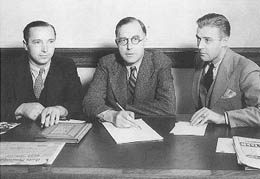On August 7, 1936, U.S. Representative Marion Zioncheck (1901-1936) leaps to his death from his fifth-floor office in the Arctic Club building in downtown Seattle. The suicide of the two-term Congressman opens his 1st District seat to a bid by King County Prosecutor Warren G. Magnuson (1905-1989), who is elected the following November.
Democratic Leader
Marion Zioncheck was born in 1901 in Poland, and arrived in Seattle with his parents four years later. He attended the University of Washington and earned a law degree while also making a name for himself as a left-wing leader in the Democratic Party and the Washington Commonwealth Federation (WCF), which supported his election to Congress in 1932 and 1934.
Over the last seven months of his life, while still a member of Congress, Zioncheck made headlines mostly for extracurricular antics and drunken escapades with his new wife, Rubeye Louise Nix, including one mid-morning frolic in the reflecting pool at Rockefeller Center in New York. Newspaper accounts following his death reported that he had experienced periods of elation and depression. In the month before his death, he had spent time in a Maryland mental hospital, from which he escaped by scaling a seven-and-a-half-foot wire fence.
He was also beset by the press and by critics of Franklin Roosevelt's New Deal policies, which he ardently championed. Zioncheck had said that he would not seek re-election in 1936 but then changed his mind and refiled. His friend and ally, King County Prosecutor Warren G. Magnuson, took him at his initial word and filed to run for Zioncheck's seat on August 1. This may have been the last straw for the embattled Congressman.
A newspaper report following his death had this to say about his mental illness: "He had been advised by his physician to take a long rest, away from political turmoil, and had been told that he could recover completely. His mental ailment had been diagnosed as manic depression" ("Zioncheck Agreed to Quit ...").
On August 7, 1936, Zioncheck completed his will and a farewell note declaring, "My only hope in life was to improve the conditions of an unfair economic system." He then leapt from the window of his office on the fifth floor of the Arctic Club Building at 3rd Avenue and Cherry Street in downtown Seattle. His body struck the pavement directly in front of a car occupied by his wife.

